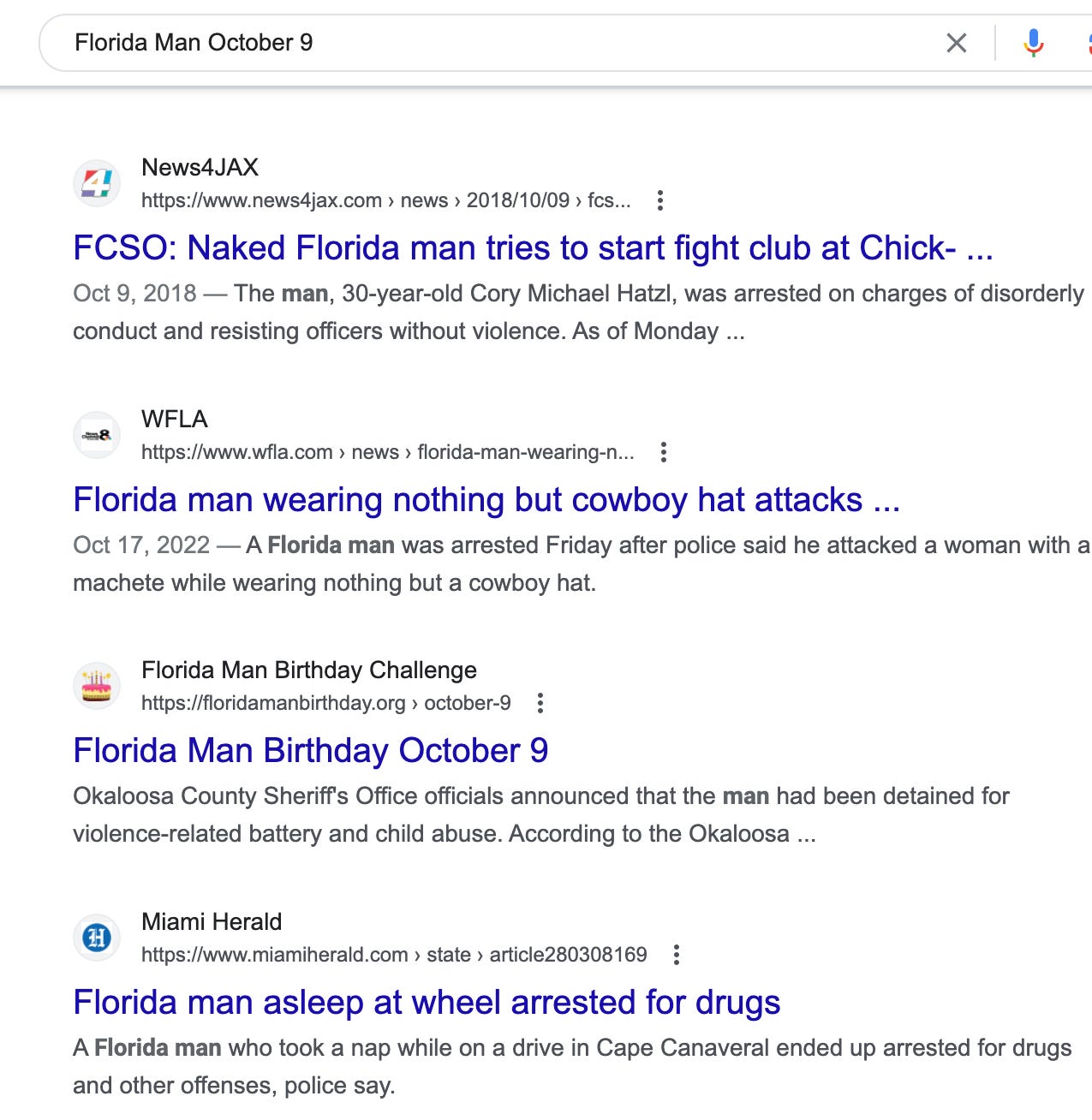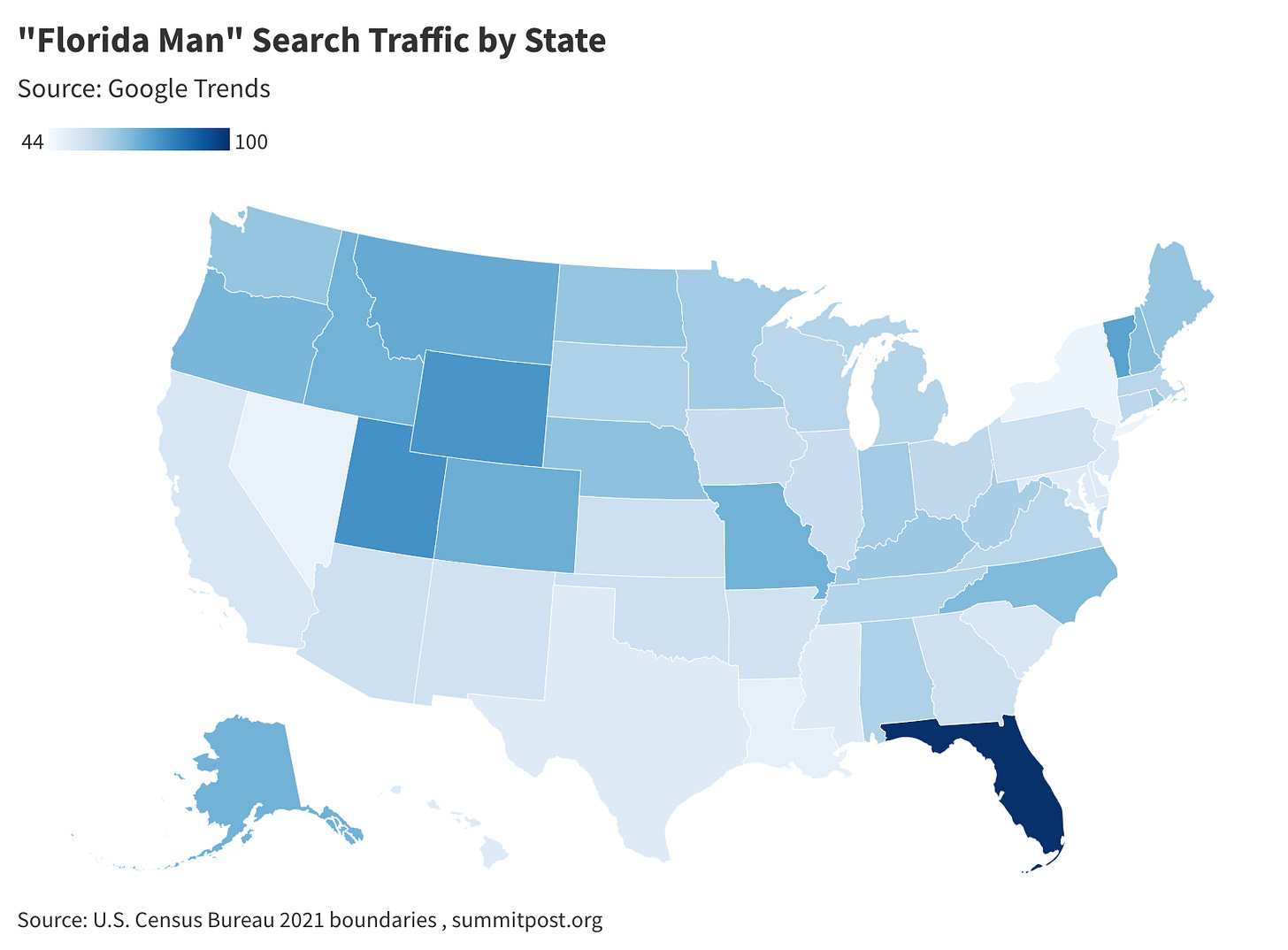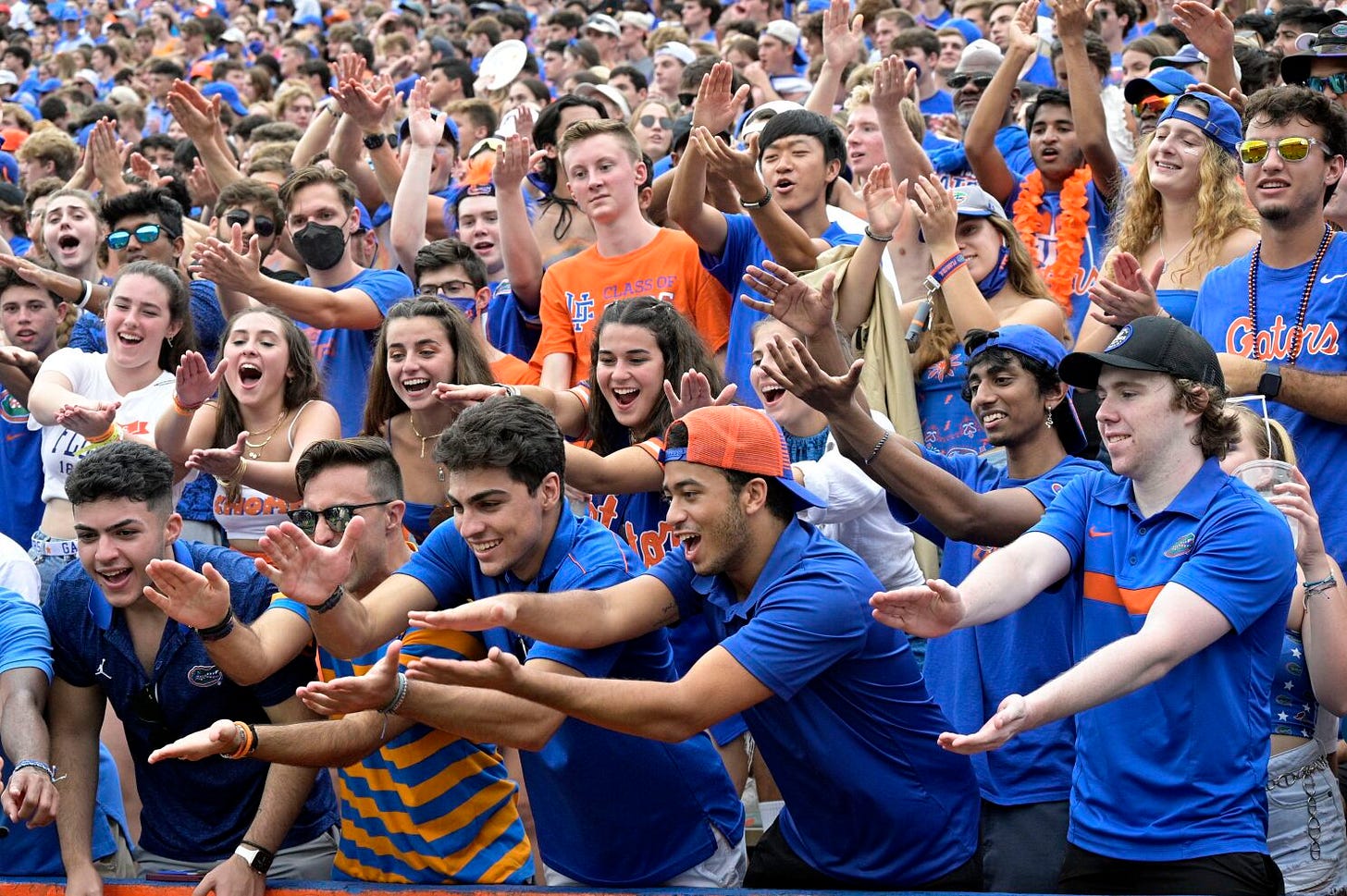Unraveling Florida Man: The Meme, The Myth, The Legend. A Statistical Analysis.
How and why does the Florida Man phenomenon exist?
Intro: Who is Florida Man?
In April of 2023, Patrick Vandermeyden-Miller stole a $540 electric scooter from a Target in Flagler County, Florida. Minutes later, when the Flagler County police arrived, they found Vandermeyden-Miller in front of the store assembling his getaway vehicle—the scooter he had just stolen. News coverage of the thief's half-witted escape quickly emerged on r/FloridaMan, a subreddit with over 773k followers "dedicated to the world's worst superhero, Florida Man."
In October of 2019, a Florida human named Cody Meader was arrested for removing a doll off store shelves at a St. Petersburg Target and "dry humping" the toy. Meader was taken into custody and admitted to doing "stupid stuff." The toy was removed from the store, and Meader's antics were chronicled by local news outlets and eventually disseminated on r/FloridaMan, Twitter, and other social media platforms.
Over the past decade, Florida Man has ascended from obscure internet schtick to mainstream meme, highlighting eccentric news headlines concerning the outlandish criminal exploits of Florida residents. To give readers a sense of what Florida Man is about, I took a sample of posts from the r/FloridaMan subreddit and visualized the words most commonly used in these headlines.
You'll notice:
Florida Man is always getting arrested, in constant conflict with law enforcement. He is a rogue vigilante, but instead of pursuing justice, Florida Man commits absurd crimes.
Florida Man often wields a gun, alcohol, drugs, or some combination of the three.
A significant portion of Florida Man tales involve alligators or sexually-charged situations.
Memes don't transpire in a vacuum. Their spread is rapid, but their recognition and proliferation are often powered by long-standing cultural representations (or misrepresentations). So today, we'll explore Florida Man's rise, the mechanics driving the meme's growth, and the unexpected circumstances surrounding its appeal.
Florida Man's Origin Story
Florida Man's roots can be traced to an unlikely origin—government transparency. Passed in 1967, Florida's Sunshine Laws mandate that all government records, including arrest reports, be made accessible to the public, ensuring transparency in the state's operations. As a result, all Florida arrest records are posted online, providing digital spectators with an abundance of eccentric crime reports—a gold mine of Florida Man source material.
Citizens of the internet took notice of this ready-made comedic content, spurring a rise in new stories and social media posts documenting Florida's quirky crimes. Slowly, the meme took shape.
In 2005, the popular internet message board FARK, a Reddit predecessor, created a "Florida" tag for its high volume of Florida-centric stories.
On January 26, 2013, the Twitter account @_FloridaMan was created to share bizarre news headlines featuring the words "Florida Man."
Five days later, the subreddit r/FloridaMan was created to fulfill a similar purpose.
Over the next few years, Florida Man remained a niche internet gag, an inside joke circulating within smaller web communities, until two watershed events propelled the meme to mainstream popularity.
A March 2018 episode of FX's Atlanta referenced the phenomenon, portraying Florida Man as a mythical alt-right psychopath perpetrating random acts of chaos. The episode was even named "Florida Man."
Atlanta elevated Florida Man to a well-known comedic punchline, but it was 2019's "Florida Man challenge" that would propel the meme into the zeitgeist. On March 19, 2019, Twitter user @g_pratimaaa urged followers to Google "Florida Man" in tandem with their birthday and to share their first search result.
The tweet garnered over 101,000 likes and 23,800 retweets within 48 hours. Word of the challenge quickly spread across the interwebs, its virality rivaling that of The Ice Bucket Challenge, Planking, Fidget Spinners, and Gangnam Style. When we look at r/FloridaMan subreddit membership, we see a spike in subscribership in March of 2018 following the Atlanta episode and an escalation of this trend with March 2019's Florida Man challenge.
The growth of r/FloridaMan traces the arc and timeline of the meme's ascension but understates the challenge's ubiquity in early 2019. Examining Google data, we find a dramatic spike in queries in March of that year, with "Florida Man" surpassing search traffic for societal ills like “diabetes” and “climate change.”
Florida Man traffic quickly receded from its March 2019 highs following the end of the internet challenge. Yet the phenomenon would have long-standing implications for Florida's media landscape and cultural identity. Florida Man, a digital tapestry of the state's most misguided citizens, would change how everyday Floridians lived their lives.
Need Help with a Data Project?
Enjoying the article thus far and want to chat about data and statistics? Need help with a data or research project? Well, you’re in luck because Stat Significant offers data science and data journalism consulting services. Reach out if you’d like to learn more.
Email daniel@statsignificant.com
The Surprising Mechanics of the Florida Man Meme
Media publications compete in a marketplace for attention. News suppliers guess what readers want to see, and consumers reward these attempts with a few minutes of attention. Florida Man stories are the product of three distinct populations: news outlets producing articles fit for Florida Man syndication, people reading and sharing these articles, and the criminals that inspire this content.
I always assumed progressives developed and disseminated the meme to subvert Florida for its politics and perceived otherness. I presumed that the Florida Man phenomenon emerged from sociopolitical tensions in the U.S., with left-leaning media stereotyping an entire state as a form of retribution. While such beliefs might contribute to the meme's consumption, they aren't the main force behind its production.
When we look at stories mentioning "Florida Man," we find the term most heavily utilized by Florida-native publications.
Initially, I found this rather confusing. Usually, regional papers don't mention their state's name when talking about locals. The New Hampshire Union Ledger does not refer to subjects as "New Hampshire Man," and the Omaha World News does not chronicle "Nebraska Man." Still, there is a chance these publications may have been referring to a "South Florida Man," using the phrase with some sort of qualifier.
To mitigate this confounding variable, we can look at "Florida Man" mentions over time. If this term is used for typical reporting reasons, its prevalence would be consistent. When we look at Florida's three largest newspapers, we see a sustained spike in "Florida Man" mentions around 2018 and 2019, mirroring the term's ascension into the mainstream, followed by elevated usage in the aftermath of the internet challenge.
Said differently, these publications may have tweaked their reporting to promote sensational stories worthy of virality, adding the words "Florida Man" for search discovery purposes. Let’s say you search "Florida Man October 9."
You see a few goofy stories published by Florida-based publications (highlighted by “Naked Florida man tries to start fight club at Chick-fil-A”) and click on one of these articles. Perhaps you stay on this page for a minute or two, reading about this mysterious Chick-fil-A fight club, enough time so that this website collects advertising revenue. Believe it or not, this frivolous search query that was inspired by a viral internet challenge just made someone money.
Florida-based news outlets may view the Florida Man phenomenon as a valuable mechanism for traffic acquisition. Some publications, like the West Palm Beach-based The Messenger, even post their stories directly on r/FloridaMan, circumventing the notion of organic virality altogether.
These publications document the humiliations of their populace for the enjoyment of readers in other states—or at least that was my initial assumption. As is a common theme with pretty much this entire analysis, my initial assumption was quite wrong. My self-righteousness was misplaced (maybe I’m out of touch).
Believe it or not, the biggest consumer of Florida Man content is, in fact, Florida. Surprisingly, Google searches for "Florida Man" and "Florida Man Meme" are highest in the Sunshine State.
At first pass, I found this extremely counterintuitive. Apparently, Florida Man spotlights bizarre news stories about Floridians produced by Florida-based media publications, and quite surprisingly, these stories are heavily consumed by Florida residents. How is this possible?
These results were perplexing. But then I remembered the first time I learned of Florida Man. I was at a Thanksgiving dinner when a Floridian at the table began explaining the meme to family and friends. She described Florida Man's premise with great excitement and recounted some of her all-time favorite headlines. At one point, I asked her why she liked the joke if it mocked her home state. She shrugged and said, "Because it's funny." This was something I never considered.
People derive humor and belonging through shared identity. Embracing the Florida Man meme likely provides Floridians a sense of cultural identity, uniting the state's residents in a shared experience of Florida's weirdness. Perhaps Florida Man is a badge of honor—a way to celebrate all that makes the state strange and lively.
Final Thoughts: The Maryland Man Challenge
The U.S. has a handful of states whose very mention implies certain sociopolitical values. This logic often condenses America's largest regions to negative stereotypes: Californians are out-of-touch progressives, Floridians perpetrate bizarre crimes, and Texans like talking about Texas and things being bigger in Texas.
The pandemic further calcified these state-centric cultural delineations. The media fixated on state-level data, correlating COVID case fluctuations with regional policies and political posturing from that state's governor. It was popular to say things like "Illinois is not doing well right now" or "Can you believe Mississippi right now?" This framing—of humans as cultural extensions of arbitrary state lines—is silly. I do not walk around thinking I am a Maryland Man living with my California Girl wife and two California Cats.
That said, regional identities provide individuals with a feeling of belonging and connection, especially in a country as vast and diverse as the United States. I grew up in Maryland, a state known for crabs, Old Bay seasoning, a beer colloquially referred to as "Natty Bo," and a memorable line of dialogue from the movie Wedding Crashers ("crabcakes and football, that's what Maryland does").
I often feel little connection to my home state because it's less memorable than Texas, Florida, or California. But then I'll see Old Bay seasoning or a shirt featuring Old Bay seasoning, and I'll feel an inexplicable wave of joy.
America's culture wars tend to reduce states to stereotypes, fixate on otherness, and frame these differences in adversarial terms. My initial understanding of Florida Man was born out of cynicism. I assumed there was no way Floridians would celebrate the meme and that this was yet another way for people to subvert something they didn't agree with. I was wrong. Florida Man is not a mascot designed to humiliate Florida; it's a mascot celebrating Florida's quirkiness.
If someone came up with a Maryland Man meme, I'd probably find it funny. I'd read the goofy news stories and participate in the Maryland Man challenge. I'd likely joke about the meme with other Marylanders and feel more connected to my community in the process.
Want to chat about data and statistics? Have an interesting data project? Just want to say hi? Email daniel@statsignificant.com
















One of the best pieces on Substack right now - phenomenal work!
most of the Maryland Men i know ought to drink Dos Equis